新概念英语3-第一课
新概念英语第三册课文[001]
![新概念英语第三册课文[001]](https://img.taocdn.com/s3/m/44c4dd48e97101f69e3143323968011ca300f780.png)
新概念英语第三册课文Lesson 1: A puma at largeVocabulary•puma (noun): a large, American, wild cat with a yellow-brown coat•cage (noun): an enclosure made of wire or bars, in which animals are kept•escape (verb): to get free from a place or situation•hunt (verb): to chase and kill wild animals for food or sport•remarkable (adjective): unusual or surprising in a way that causes people to take noticeIntroductionIn Lesson 1 of the third book of New Concept English, the author recounts a thrilling encounter with a puma that escaped from its cage. The story is set in a zoo, where the author is visiting and observing the animals.The storyThe author describes how he was standing in front of the cage of a puma, admiring its strength and beauty. Suddenly, the puma made a powerful leap, using its muscular body to propel itself out of the cage. The author and the other visitors in the zoo were left in a state of shock as the cat landed gracefully on the ground.The puma wasted no time and immediately started to run towards the exit of the zoo. The author watched in awe as the mighty cat effortlessly jumped over barriers and evaded capture. The zookeepers, armed with tranquilizer guns, chased after the animal, but were unsuccessful in their attempts.As the puma made its way through the surrounding countryside, the author became increasingly anxious about the potential dangers it could pose to people living in nearby villages. The puma was known to be a skilled hunter, and its escape meant that innocent lives could be in danger.The author then describes how the puma managed to evade capture for two weeks. It outsmarted the zookeepers and continued to terrorize the countryside, killing livestock and causing panic among the villagers. Its remarkable ability to hide and move stealthily made it extremely difficult to catch.In the end, the author tells us that the puma was finally captured by a group of experienced hunters. The dangerous animal was eventually returned to its cage in the zoo, but the incident left a lasting impressi on on the author’s mind. He was amazed by the power and agility of the puma and the challenges faced by the people trying to catch it.ConclusionLesson 1 of the third book of New Concept English presents a gripping story of a puma that escaped from its cage at a zoo. The author vividly describes the awe-inspiring sight of the powerful cat and the difficulties faced in recapturing it. The puma’s escape serves as a reminder of the untamed nature of wild animals and the challenges involved in their captivity.。
新概念英语第三册第一课课件NCE3_lesson01(共20页)
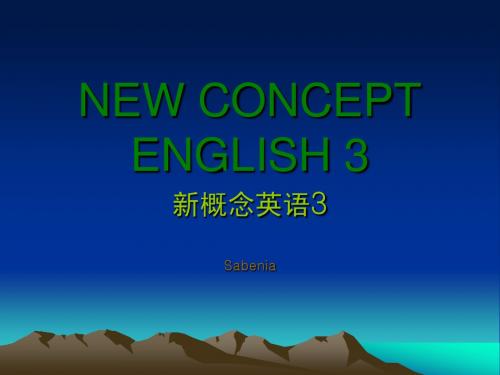
Retell the text
• Reports—London zoo–puma spotted—45 miles south of London • Similar in nature • Woman picking blackberries saw it first • Puma moved from place to place • Left trail of dead deer—small animals • Paw prints—puma fur found as well • ‘cats-like noises’—heard at night • Animal seen up a tree • Now experts convinced—really was a puma
• Reports—London zoo–puma spotted—45 miles south of London • Similar in nature • Woman picking blackberries saw it first • Puma moved from place to place • Left trail of dead deer—small animals • Paw prints—puma fur found as well • ‘cats-like noises’—heard at night • Animal seen up a tree • Now experts convinced—really was a puma
Assignments
• 熟读课文 • 默写单词 • 书后练习
第二课时
• 复习上节课内容 • 详解课文 • 完成书后练习
Dictation
• • • • • • • • • • • • • • • puma(title) n. spot v. evidence n. accumulate v. oblige v. hunt n. blackberry n. human being Corner v. trail n. print n. cling (clung,clung) v. convince v. somehow adv. Disturb v.
新概念英语第三册第一课

• hunt down chase down after the escaped prisoner. • The police hunted find • Professor Jones hunted down the written manuscript in the library. • hunt for • He is hunting for a new job. look for
• • • • •
Somehow Somehow , I know he’ll succeed. I dislike him somehow. Somewhat She is somewhat sad.=she is kind of sad.
Puma at large
• Pumas are large, cat-like animals which
• The hunt for the puma began in a small village where a woman picking blackberries saw 'a large cat' only five yards away from her. It immediately ran away when she saw it, and experts confirmed that a puma will not attack a human being unless it is cornered. The search proved difficult, for the puma was often observed at one place in the morning and at another place twenty miles away in the evening.
新概念英语第三册第一课

10. It is disturbing to think that a dangerous wild animal is still at large in the quiet countryside.
• disturbing adj. 令人不安的
• • • •
at large (1)逃遁的, 没有被控制的 例句:The thief is still at large. (2)详细地(= in detail) 例句:I need talk to you at large.
•试着模仿这个句型来造句 •句型:sth be + adj. + n-like + n. which/who +句子
•1. 熊猫是巨大的,像熊一样的动物,产于四川省。 •Pandas are large, bear-like animals which are found in Sichuan province. •2. 长沙是一座漂亮的花园式的城市,它位于中国中南部。 •Changsha is a modernized, garden-like city which lies in central south part of China.
6. Wherever it went, it left behind it a trail of dead deer and small animals like rabbits.
•leave...behind 留下,遗留 •例句:I left my wallet behind in the kitchen. •a trail of 一串,表示很多 例句:Every success has a trail of failures behind it.
新概念英语第三册课文及详解第1课
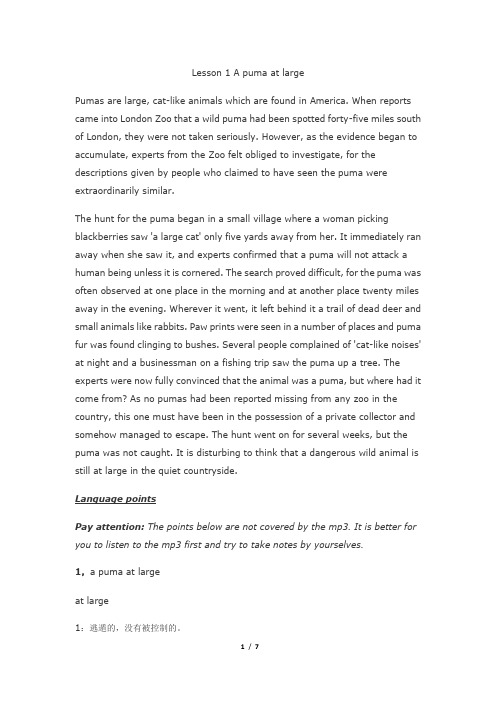
Lesson 1 A puma at largePumas are large, cat-like animals which are found in America. When reports came into London Zoo that a wild puma had been spotted forty-five miles south of London, they were not taken seriously. However, as the evidence began to accumulate, experts from the Zoo felt obliged to investigate, for the descriptions given by people who claimed to have seen the puma were extraordinarily similar.The hunt for the puma began in a small village where a woman picking blackberries saw 'a large cat' only five yards away from her. It immediately ran away when she saw it, and experts confirmed that a puma will not attack a human being unless it is cornered. The search proved difficult, for the puma was often observed at one place in the morning and at another place twenty miles away in the evening. Wherever it went, it left behind it a trail of dead deer and small animals like rabbits. Paw prints were seen in a number of places and puma fur was found clinging to bushes. Several people complained of 'cat-like noises' at night and a businessman on a fishing trip saw the puma up a tree. The experts were now fully convinced that the animal was a puma, but where had it come from? As no pumas had been reported missing from any zoo in the country, this one must have been in the possession of a private collector and somehow managed to escape. The hunt went on for several weeks, but the puma was not caught. It is disturbing to think that a dangerous wild animal is still at large in the quiet countryside.Language pointsPay attention: The points below are not covered by the mp3. It is better for you to listen to the mp3 first and try to take notes by yourselves.1,a puma at largeat large1:逃遁的,没有被控制的。
新概念英语第三册第一课课件NCE3_lesson01
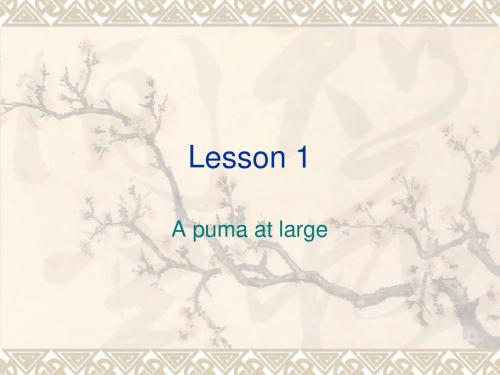
2.
3. 4.
It immediately ran away when she saw it, and experts confirmed that…. Unless it is concerned. The search proved difficult, for the puma was often observed at one place in the morning and …. And pima fur was found clinging to bushes. This one must have been in the possession of private collector and …
3. because, since, as, for 1) Because 语气最强, 回答why的问句,可与 强调词only,just连用,也可用在强调句型 It is (was)+ 强调部分 +that (who) 从句; I was late because I went to hospital yesterday. I was because I went to hospital yesterday that I was late. 2) Since 表示人们已知的事实,“既然” Since it is cold today, why not just stay at home and do some reading?
V. Grammar
1. 2.
分隔式同位语从句 同位语从句与定语从句的区别
同位语从句
1.在复合句中充当同位语的名词性从句称为同 位语从句;即名词fact, problem, proposal, suggestion, report, idea 等后面的that从句, 它的作用相当于名词,对前面的名词(短语)加 以补充说明或进一步解释。 I believe that fact that he tried what he can. 2. 分隔式同位语从句 为使句子结构平衡,避免头重脚轻,同位语从 句可以放到句子末尾。
新概念英语第三册课堂笔记

新概念英语第三册课堂笔记
第一课:A Puma at Large
这一课是讲一个美洲狮(Puma)从动物园逃走之后引起的一连串事件。
在这一课中研究了比较复杂的动物类词汇,如puma这个词的发音等。
同时研究了一些高阶词汇,如reptile等等。
第二课:The Corner Shop
这一课是讲一个小男孩买东西的故事,研究了表示偏见或者歧视的词语,如chink,colored等词汇。
第三课:The Old Brown Suitcase
这一课是讲一个老妇人来英国看望女儿,在海关入关时发生的事情。
研究了一些有关旅行和移民的词汇,比如passport,visa,customs等等。
第四课:New Zealand
这一课是介绍新西兰的一些景点、风俗和文化,研究了一些与旅游相关的词汇,比如tour,arrangement等等。
第五课:Dead Men’s Path
这一课是讲非洲的一所学校校长试图改善学校环境和质量的故事,以及他和当地居民之间的冲突。
研究了一些值得思考的词汇,比如superstition等等。
总结
新概念英语第三册是一本适合中高级英语学习者使用的教材,在词汇量和语法难度上都有了一定的提高。
通过学习这本教材,可以不仅仅提高自己的阅读和听力能力,还能更好地了解西方文化和习惯。
新概念英语第三册Lesson 1

3. force sb to do by law because it is a duty
4. gradually get more and more of sth
e____________
s____________ o____________ a________
同意词:
find:强调发现的结果 find out:查出事实真相 discover:做出重大发现 notice:注意到 observe:观察 watch:观察活动中的人或画面
spot
n. 斑点;地点;疙瘩
spot n.斑点 There is a white spot on the shirt. Which has spots, the leopard or the tiger?
※ in evidence 显而易见的;显眼 -- He was in evidence at the party.
There is no evidence/proof that the knife belonged to her. The room had evidence of a struggle.
Lesson 1 A Puma at Large
contents
part 1 background story part 2 words and expressions Part 3 Reading Comprehension Part 4 Grammar
contents
part 1 background story part 2 words and expressions Part 3 Reading Comprehension Part 4 Grammar
新概念三第一课原文

新概念三第一课原文新概念英语是一套广泛使用的英语教材,其中第三册包含了很多有趣的课文,让学习者能够提高他们的阅读和理解能力。
以下是新概念英语第三册第一课的原文:Lesson 1 A Puma at Large.The puma is a large, fierce cat that roams the Patagonian plains of southern Argentina. It is a powerful hunter and can bring down animals that are much larger than itself. The gauchos, who are the cowboys of the Argentine plains, have often seen pumas catch their prey. They say that the puma usually hunts alone and its favourite prey is the guanaco, which is a large animal similar to the llama. The guanaco is much faster than the puma, but it cannot keep up its speed for very long. When the puma sees a guanaco, it begins to stalk it. It sneaks up on its prey very slowly and quietly, using the cover of bushes and trees. When it is quite close, it makes a sudden spring and attacks the guanaco. The puma kills its prey by bitingthrough the back of the animal's neck.One day, a young gaucho saw a puma attack a guanaco. He was amazed that the guanaco did not attempt to escape, forit could easily have outrun the puma. He watched the pumafor some time. It was not until the animal disappeared into the distance that he realized what had happened. The guanaco had been dead from the moment the puma bit its neck.The puma had not killed it for food; it had simplybitten its neck to satisfy its desire to kill. The gaucho knew that a puma will often kill just for the pleasure of killing. He also knew that it was extremely dangerous to come across a puma that was hungry. A hungry puma willattack a human being without the slightest hesitation.This lesson tells us how the puma hunts and kills its prey. It also tells us that a puma will attack a humanbeing if it is hungry.。
新概念英语第三册第1课-A Puma at large

新概念英语第三册第1课:A Puma at largeLesson 1 A puma at large逃遁的美洲狮Listen to the tape then answer the question below.听录音,然后答复以下问题。
Where must the puma have come fromPumas are large, cat-like animals which are found in America. When reports came into London Zoo that a wild puma had been spotted forty-five miles south of London, they were not taken seriously. However, as the evidence began to accumulate, experts from the Zoo felt obliged to investigate, for the descriptions given by people who claimed to have seen the puma were extraordinarily similar.The hunt for the puma began in a small village where a woman picking blackberries saw a large cat only five yards away from her. It immediately ran away when she saw it, and experts confirmed that a puma will not attack a human being unless it is cornered. The search proved difficult, for the puma was often observed at one place in the morning and at another place twenty miles away in the evening. Wherever it went, it left behind it a trail of dead deer and small animals like rabbits. Paw prints were seen in a number of places and puma fur was found clinging to bushes. Several people complained of cat-like noises at night and a businessman on a fishing trip saw the puma up a tree. The experts were now fully convinced that the animal was a puma, but where had it come from As no pumas had been reported missing from any zoo in the country, this one must have been in thepossession of a private collector and somehow managed to escape. The hunt went on for several weeks, but the puma was not caught. It is disturbing to think that a dangerous wild animal is still at large in the quiet countryside.参考译文美洲狮是一种体形似猫的大动物,产于美洲。
(完整版)新概念英语第三册课文及详解第1课
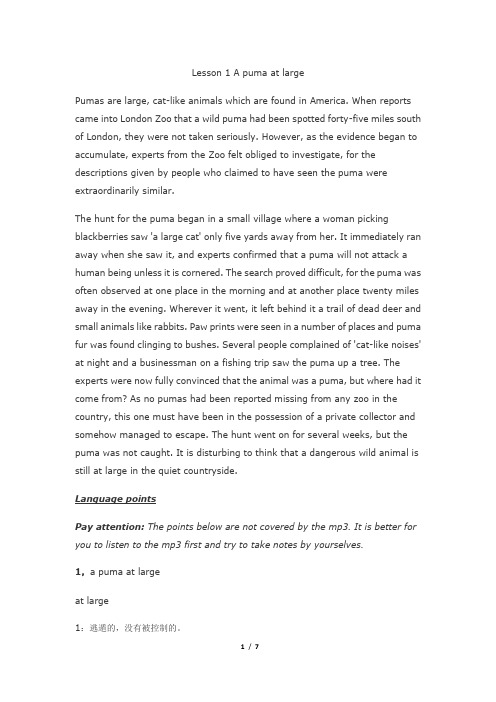
Lesson 1 A puma at largePumas are large, cat-like animals which are found in America. When reports came into London Zoo that a wild puma had been spotted forty-five miles south of London, they were not taken seriously. However, as the evidence began to accumulate, experts from the Zoo felt obliged to investigate, for the descriptions given by people who claimed to have seen the puma were extraordinarily similar.The hunt for the puma began in a small village where a woman picking blackberries saw 'a large cat' only five yards away from her. It immediately ran away when she saw it, and experts confirmed that a puma will not attack a human being unless it is cornered. The search proved difficult, for the puma was often observed at one place in the morning and at another place twenty miles away in the evening. Wherever it went, it left behind it a trail of dead deer and small animals like rabbits. Paw prints were seen in a number of places and puma fur was found clinging to bushes. Several people complained of 'cat-like noises' at night and a businessman on a fishing trip saw the puma up a tree. The experts were now fully convinced that the animal was a puma, but where had it come from? As no pumas had been reported missing from any zoo in the country, this one must have been in the possession of a private collector and somehow managed to escape. The hunt went on for several weeks, but the puma was not caught. It is disturbing to think that a dangerous wild animal is still at large in the quiet countryside.Language pointsPay attention: The points below are not covered by the mp3. It is better for you to listen to the mp3 first and try to take notes by yourselves.1,a puma at largeat large1:逃遁的,没有被控制的。
(完整)新概念第三册第一课

【新概念第三册第一课】讲义Lesson 1 A puma at large 逃遁的美洲狮【课文精讲】1 Pumas are large, cat—like animals which are found in America.【构词法】catlike-like adj。
后缀“像……一样”lady like ? 比较womanly (飘)台词(Scarlett发现Rhett偷听到他对Ashley 的透骨表白,说道eg: Scarlett: ”Sir,You're no gentleman.”Rhett:” And you, Miss, are no lady。
”(M。
Mitchell: Gone With theWind, ch。
4 )—-"像淑女、名门闺秀一样"“像……一样"比喻修辞,eg:crystal-like girl 明亮的剔透的双眸 steel-like muscle 坚实的肌肉生活中也经常用到,如:长的如花似玉、貌美如仙 angel-like girl 天使般的(记着学会夸女孩哦,虽然她知道你是非常精熟的运用夸张的修辞手法,但还是会心花怒放的)-ly adv。
adj。
“古英语 lic = like "eg: friendly (像朋友一样的——“友好的”)worldly 与“religion, spiritual, heaven"相对的“世俗的,尘世的”在江湖混久了“老江湖,深喑人情世故的,老练的,会处事的”—ish "具有……性质的"eg: foolish, selfish, bookish(死读书的,学究气的,只有理论知识没有实践的)【辨析】childlike “老顽童像孩子般天真烂漫心无城府的"childish“幼稚的傻的愚蠢的不成熟的”manlike “像男人一样的,像男人一样喝酒,赚钱,生活”manly “很男人的具有男子汉气概的”mannish “李宇春"-ly “好的”“赞赏" “褒义”—like “偏好,介于两者之间" “中性”-ish “不好的" “嘲讽”“贬义”cat 独特的国俗语义:“cat”用来象征“尖酸刻薄,爱在背后说别人怀话的女人."eg: "…Scarlett, you remember how he run after you last Christmas…"”Don't be a cat, Miss。
新概念英语三第一课(共28张PPT)
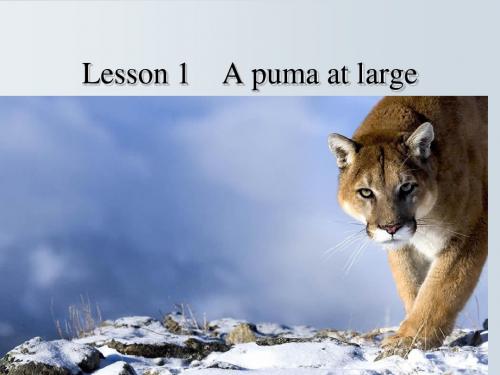
(sb.) be in possession of (sth.) 拥有 A private collector was in possession of a puma.
多为抽象和理念名词。词的范 围极为有限,如:fact,news, promise,thought I have no idea when we will go shopping.
if, which 不能引导 I have no idea what we should do next.
限定修饰作用 The news that he got from the teacher made me sad. 在定语从句中充当主语、宾语、 表语。 The news that he got from the teacher made me sad. 词的范围很广 Have you read the book that/which was written by John?
同位语从句
定语从句
意义 引导词的功能 先行词的特点
引导词
解释前面名词的具体内容。 The news that he failed in the test made me sad.
起连接符号的作用,不 充当成分。
The news that he failed in the test made me sad.
pile up Books piled up on my desk.
A Puma at large a suspect at large The disease is still at large.
新概念英语第三册Lesson 1
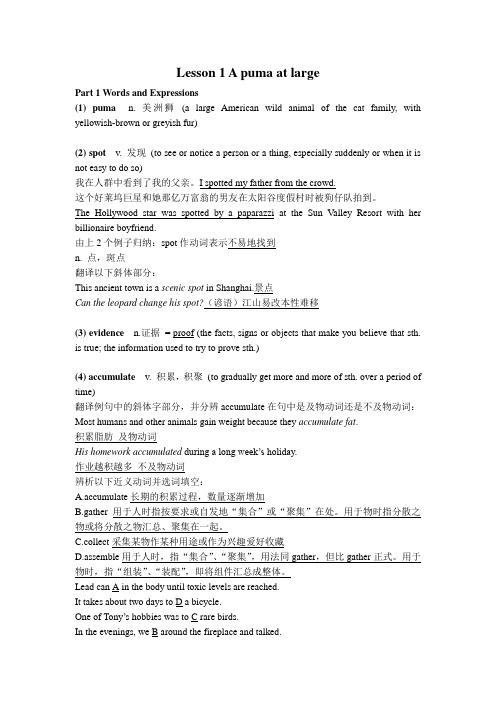
Lesson 1 A puma at largePart 1 Words and Expressions(1) puma n. 美洲狮(a large American wild animal of the cat family, with yellowish-brown or greyish fur)(2) spot v. 发现(to see or notice a person or a thing, especially suddenly or when it is not easy to do so)我在人群中看到了我的父亲。
I spotted my father from the crowd.这个好莱坞巨星和她那亿万富翁的男友在太阳谷度假村时被狗仔队拍到。
The Hollywood star was spotted by a paparazzi at the Sun Valley Resort with her billionaire boyfriend.由上2个例子归纳:spot作动词表示不易地找到n. 点,斑点翻译以下斜体部分:This ancient town is a scenic spot in Shanghai.景点Can the leopard change his spot?(谚语)江山易改本性难移(3) evidence n.证据= proof (the facts, signs or objects that make you believe that sth. is true; the information used to try to prove sth.)(4) accumulate v. 积累,积聚(to gradually get more and more of sth. over a period of time)翻译例句中的斜体字部分,并分辨accumulate在句中是及物动词还是不及物动词:Most humans and other animals gain weight because they accumulate fat.积累脂肪及物动词His homework accumulated during a long week’s holiday.作业越积越多不及物动词辨析以下近义动词并选词填空:A.accumulate长期的积累过程,数量逐渐增加B.gather用于人时指按要求或自发地“集合”或“聚集”在处。
新概念英语三第一课课件

cat-like=like cat
dog-like
mother-like
例:大熊猫是大型的体型像猫的动物,产业中国 。
Pandas are large, cat-like animals which are found in China.
spot v. 看出,发现 =see, pick out, recognize 强调结果 例:The prisoner was easily spotted in the crowed since he wore handcuffs.
unsettled.
Exercises:
1. The fact ____ she works hard is well known to us all. A. that B. what C. why D. which
2. The fact ____ he was successful proves his ability. A. that B. what C. which D. why
经过一些调查,我已经确定他们是伪娘。 After some investigation, I have confirmed that they are the so-called“girly-man”.
corner n. 角落 around the corner 即将到来 例:A storm is around the corner for the sky is dark and gray. v. corner sth/sb 使走投无路
The experts from London zoo began to hunt(v.) for a puma. the hunt for the puma proved
新概念英语3-第一课
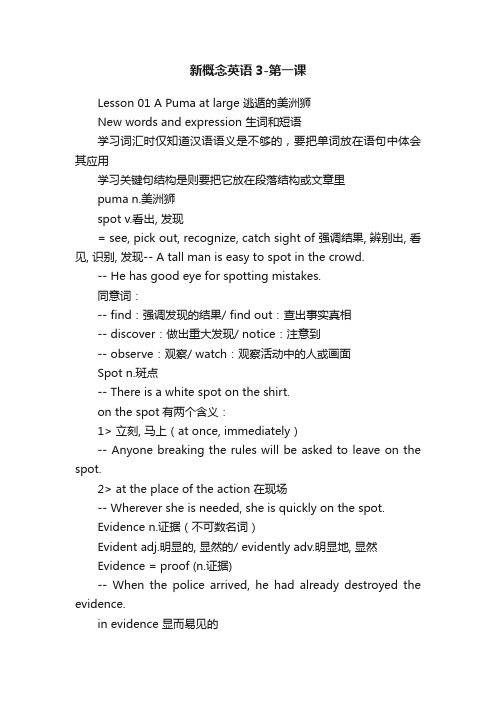
新概念英语3-第一课Lesson 01 A Puma at large 逃遁的美洲狮New words and expression 生词和短语学习词汇时仅知道汉语语义是不够的,要把单词放在语句中体会其应用学习关键句结构是则要把它放在段落结构或文章里puma n.美洲狮spot v.看出, 发现= see, pick out, recognize, catch sight of 强调结果, 辨别出, 看见, 识别, 发现-- A tall man is easy to spot in the crowd.-- He has good eye for spotting mistakes.同意词:-- find:强调发现的结果/ find out:查出事实真相-- discover:做出重大发现/ notice:注意到-- observe:观察/ watch:观察活动中的人或画面Spot n.斑点-- There is a white spot on the shirt.on the spot有两个含义:1> 立刻, 马上(at once, immediately)-- Anyone breaking the rules will be asked to leave on the spot.2> at the place of the action 在现场-- Wherever she is needed, she is quickly on the spot.Evidence n.证据(不可数名词)Evident adj.明显的, 显然的/ evidently adv.明显地, 显然Evidence = proof (n.证据)-- When the police arrived, he had already destroyed the evidence.in evidence 显而易见的-- He was in evidence at the party.Accumulate v.积累, 积聚(强调积累的过程)-- As the evidence accumulates, experts from the zoo felt obliged to investigate. Gather vt.聚集, 把某人召集在某处-- The teacher gathered his students in the classCollect vt.搜集, 采集-- Do you collect stamps? Yes, I collect stamps as my hobby.(n.业余爱好)Assemble v.集合, 集会/ 装配-- A large number of people assemble on the square.Hoard vt.大量的储存(-- hoard up = store up 储藏)-- The squirrel hoards up nuts for the cold winter (squirrel n.松鼠)(nut n.坚果)amass vt.积聚(主要用于诗歌和文学作品)-- The clouds amassed above the hillsOblige v.使…感到必须feel obliged to do sth 感觉有必要做某事-- I feel obliged to say no to his demand(n.要求, 需要)be obliged to do sth 被迫做某事-- They were obliged to sell their car to pay their debts off.(debt n.债务)hunt v.n.追猎, 寻找(hunt for)-- The experts from London zoo began to hunt (v.) for a puma.-- The hunt (n.) for the puma proved the difficult. (prove vt.证明, 证实)search 搜寻某处为了寻找到某人或某物-- The police were searching the forest for the missing boy.run after 强调追赶, 追求-- look, a dog is running after a cat-- what are you run after in your lifeseek = pursue v.追寻(理想)chase v.追赶(-- They are chasing a thief / They are running after a thief)blackberry n.黑莓/ berry n.浆果human being 人类corner v.使走投无路, 使陷入困境作为动词, 经常使用被动语态-- The thief was cornered at last-- The problem cornered me.corner n.角落-- at the corner of the street -- in the corner of the room -- on the corner of the deskTrail n.一串, 一系列trail vt. 跟踪, 追踪(= follow)-- The police trailed the criminal to the place where he was hiding (criminal n.罪犯)Print n.印痕Cling v.粘(clung, clung, clinging)-- She is always clinging to her mother.-- He clung to the hope that he would succeed. 他怀有成功的希望stick v.粘住(-- stick the envelop)n.信封stick to 坚持(-- stick to the plan / stick to one’s promise)n.许诺sticky adj.粘的(-- sticky fingers)convince v.使…信服1>convince sb of sth -- I convince him of my honesty.(n.诚实, 正直)我使他相信我的诚实。
新概念三第一课重点词汇及短语

新概念第三册笔记第一课:a puma at largePuma:美洲狮(学名:Pumaconcolor)又称美洲金猫、山狮、银狮等,是栖息于北美洲、中美洲、南美洲的食肉目猫科动物,分类上属美洲金猫属。
体形和花豹相仿,但外观上没有花纹且头骨较小。
美洲狮擅于跳跃,主要以野生动物兔、羊、鹿为食,在饥饿时也会盗食家畜家禽,在北美某些区域已逐渐与人类生活圈靠近,因此在受到人类威胁时会袭击人类。
美洲狮属于《濒危野生动植物种国际贸易公约》附录I中的濒危动物,某些亚种如东部美洲狮已经灭绝。
•Report:[rɪ'pɔrt]:n. 报告;报道;成绩单vt. 报告;报导;使报到EG:Have you looked at their report?短语:survey report 检验报告weather report 天气预报,天气报告;气象报告news report 新闻报道,时事报告•spot: n. 地点;斑点•vt. 认出,发现;弄脏;用灯光照射短语:bright spot 光点;辉点;高兴的事white spot 白斑;白点;白点病EG:Tom failed to spot the error.She spotted her friend in the crowd。
她在人群中发现了她的朋友。
近义词:n.地点;斑点location, site, whereV发现:find,discover,detectTake sth.seriously :郑重对待,认真对待Eg:you cant take her promises seriously,she never keeps her words.Take sth lightly 草率对待,草率处理Take sth for granted 认为某事是当然的,认为某事是不成问题的Eg:it must be taken for granted that he’ll do the work wee.•Evidence ['ɛvɪdəns] :n. 证据,证明;迹象;明显vt. 证明•近义词:proof证明, Eg:do you have any proof that you are the owner of the car? •witness 证人:Eg: god is my witness.•Confirmation:证实Eg: we are waiting for confirmation of the news. •Accumulate[ə'kjumjəlet]: vi. 累积;积聚Eg:to accumulate great wealth by hard work.Amass v 大量收集Obliged [ə'blaidʒ] adj. 必须的,必要的;感激的;有责任的n. obligation义务;职责;债务•Eg:you are not obliged to answer these questions .•Be /feel obliged to do sth 觉得有必要做•Eg: I feel obliged to say sorry to him.Investigate[ɪn'vɛstɪɡet] v. 调查;研究n. investigation调查;调查研究investigative研究的;调查的;好调查的Eg: We should not jump to conclusions. Let's investigate first•我们不应草率下结论,还是先调查一下吧。
新概念英语3 第一课
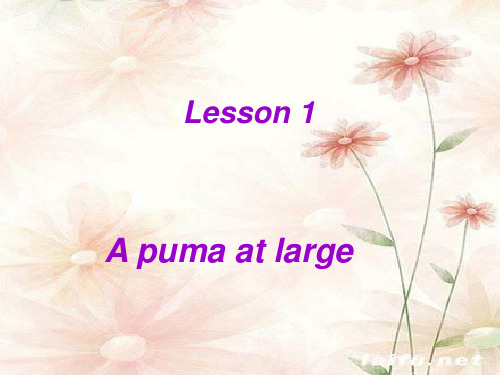
使某人相信某事 说服某人 坚信,确信,深信
典型例句 我怎样才能使你相信她说的是实话?
How can I convince you of his honest?
是什么使你投他的赞成票?
What convinced you to vote for them?
我相信她说的是实话。
somehow adv. 不知怎么搞的,不知什么原因,反正
Text 1. When reports came into London Zoo that a wild puma had been spotted forty-five miles south of London, they were not taken seriously.
结构分析 复合句,when引导时间状语从句;that引导 同位语从句,对先行词report作进一步说明。 典型例句 俗话说熟能生巧。
对他不利的证据越来越多。
Evidence was piling up against him.
oblige v. 迫使,责成
固定搭配
be / feel obliged to do sth.
觉得有必要做某事
你不必回答这个问题。
You are not obliged to answer this question.
Grammar 定语从句与同位语从句的区别 a. 同位语从句相当于名词,与前面名词是同位关系,是前面 名词内容的具体表述;定语从句相当于形容词,对先行词 起修饰、描述与限制作用。 b. that 在同位语从句中不但当任何成分,仅起连词作用;但 在定语从句中为关系代词,充当一定的句子成分。 c. that + 完整句子 → 同位性质 that + 不完整句子 → 定语从句 如: The fact that he succeeded in the experiment pleased everybody. (同位语从句连词that不担当任何句子成分) The fact that we talked about is important. (定语从句,关系代词that作宾语) d. when, where, why引导定语从句时,分别指前面先行词 所表示的时间、地点和原因,否则为同位语从句。如:
新概念3第一课
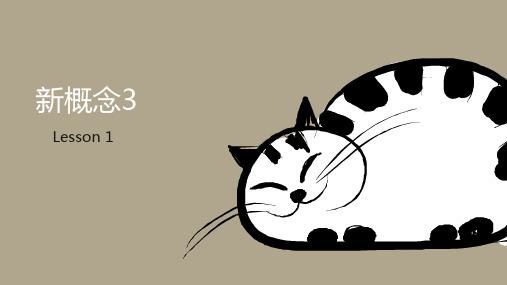
【new words】
trail n.一串,一系列 a trail of blood 一道血迹
The truck left a trail of dust.
The telephone call interrupted my trail of thought. a chain of 一连串,一系列 a series of 一连串,一系列 a chain of mountains/ a mountain chain 山脉
【new words】
similar adj.
be similar to sb. in character 性格上与某人相似
look like(+n.)看起来像(外貌)/ be like(性格、外 貌t) take after sb.(相貌、性格等)像某人,随某人 He takes after his father in being weak-minded. resemble v..相似,类似 He resembles his father in character.
【new words】
complain v.报怨;诉苦 complain about/to 报怨,埋怨 complain to sb. about/of You indeed have nothing to complain of. She's now complaining to the manager about the service. She complained that he had always been rude to her. complaint n. 抱怨
chain store print n.印痕 foot print 脚印 finger print 指纹 water mark 水印
- 1、下载文档前请自行甄别文档内容的完整性,平台不提供额外的编辑、内容补充、找答案等附加服务。
- 2、"仅部分预览"的文档,不可在线预览部分如存在完整性等问题,可反馈申请退款(可完整预览的文档不适用该条件!)。
- 3、如文档侵犯您的权益,请联系客服反馈,我们会尽快为您处理(人工客服工作时间:9:00-18:30)。
Lesson 01 A Puma at large 逃遁的美洲狮New words and expression 生词和短语学习词汇时仅知道汉语语义是不够的,要把单词放在语句中体会其应用学习关键句结构是则要把它放在段落结构或文章里puma n.美洲狮spot v.看出, 发现= see, pick out, recognize, catch sight of 强调结果, 辨别出, 看见, 识别, 发现-- A tall man is easy to spot in the crowd.-- He has good eye for spotting mistakes.同意词:-- find:强调发现的结果/ find out:查出事实真相-- discover:做出重大发现/ notice:注意到-- observe:观察/ watch:观察活动中的人或画面Spot n.斑点-- There is a white spot on the shirt.on the spot有两个含义:1> 立刻, 马上(at once, immediately)-- Anyone breaking the rules will be asked to leave on the spot.2> at the place of the action 在现场-- Wherever she is needed, she is quickly on the spot.Evidence n.证据(不可数名词)Evident adj.明显的, 显然的/ evidently adv.明显地, 显然Evidence = proof (n.证据)-- When the police arrived, he had already destroyed the evidence.in evidence 显而易见的-- He was in evidence at the party.Accumulate v.积累, 积聚(强调积累的过程)-- As the evidence accumulates, experts from the zoo felt obliged to investigate. Gather vt.聚集, 把某人召集在某处-- The teacher gathered his students in the classCollect vt.搜集, 采集-- Do you collect stamps? Yes, I collect stamps as my hobby.(n.业余爱好)Assemble v.集合, 集会/ 装配-- A large number of people assemble on the square.Hoard vt.大量的储存(-- hoard up = store up 储藏)-- The squirrel hoards up nuts for the cold winter (squirrel n.松鼠)(nut n.坚果)amass vt.积聚(主要用于诗歌和文学作品)-- The clouds amassed above the hillsOblige v.使…感到必须feel obliged to do sth 感觉有必要做某事-- I feel obliged to say no to his demand(n.要求, 需要)be obliged to do sth 被迫做某事-- They were obliged to sell their car to pay their debts off.(debt n.债务)hunt v.n.追猎, 寻找(hunt for)-- The experts from London zoo began to hunt (v.) for a puma.-- The hunt (n.) for the puma proved the difficult. (prove vt.证明, 证实)search 搜寻某处为了寻找到某人或某物-- The police were searching the forest for the missing boy.run after 强调追赶, 追求-- look, a dog is running after a cat-- what are you run after in your lifeseek = pursue v.追寻(理想)chase v.追赶(-- They are chasing a thief / They are running after a thief)blackberry n.黑莓/ berry n.浆果human being 人类corner v.使走投无路, 使陷入困境作为动词, 经常使用被动语态-- The thief was cornered at last-- The problem cornered me.corner n.角落-- at the corner of the street -- in the corner of the room -- on the corner of the deskTrail n.一串, 一系列trail vt. 跟踪, 追踪(= follow)-- The police trailed the criminal to the place where he was hiding (criminal n.罪犯)Print n.印痕Cling v.粘(clung, clung, clinging)-- She is always clinging to her mother.-- He clung to the hope that he would succeed. 他怀有成功的希望stick v.粘住(-- stick the envelop)n.信封stick to 坚持(-- stick to the plan / stick to one’s promise)n.许诺sticky adj.粘的(-- sticky fingers)convince v.使…信服1>convince sb of sth -- I convince him of my honesty.(n.诚实, 正直)我使他相信我的诚实。
2> be convinced that…-- I am convinced that she is honest girl.(adj.诚实的, 正直的)somehow adv.不知怎么搞地, 不知什么原因= by some means, in some way, for some reason unknown-- I’ll get the book back somehow. 无论如何我要把这本书取回来。
-- I got lost somehow 不知怎么搞地, 我迷失了。
Somewhat adv.稍微, 有点, 有些(= a little)-- The price is somewhat higher than I expect.(high adj.高的)disturb v.令人不安disturbing adj.令人不安的/ disturbed adj.感到不安的surprising adj.令人惊讶的/ surprised adj.感到惊讶的exciting adj.令人激动的/ excited adj.感到激动的wild adj.野性的, 野生的investigate v.调查, 研究description n.描写, 描述extraordinarily adv.特别地,非常地,格外similar adj.相似的, 类似的attack vt.攻击difficult adj.困难的, 艰难的difficulty n.困难, 难点rabbit n.兔, 野兔paw n.手掌, 手爪fur n.毛皮, 毛, 软毛bush n.矮树丛fully adv.充分地, 完全地collector n.收藏家, 征收者Text 课文at large 逃遁的, 没有被控制的-- The thief is still at largeat large 详细地(= in detail)n.细节, 详情-- I need talk to you at largeat large 总体来讲(= as a whole)-- The students at large are hungry for English. (hungry adj.饥饿的, 渴望的)Where must the puma have come from?Pumas are large, cat-like animals which are found in America.在英文的表达方式中,首先呈现给读者的是结果(和中文不同)英文擅长用长句,中文擅长用短句。
-- Pandas are large cat-like animals which are found in Asia. (panda n.熊猫)cat-like 猫一样的, 偷偷摸摸的/ dog-like 狗一样的/ life-like 栩栩如生的When reports came into London Zoo that a wild puma had been spotted forty-five milessouth of London, they were not taken seriously.一般来讲定语从句和同位语从句紧随在被修饰名词的后面,但为了保持句子平衡,也可以把谓语动词放到从句之前1> 定语从句只是对于被修饰词的补充说明、修饰-- 定语从句的引导词:-- 指人:主语who;宾语who, whom;定语 whose-- 指物:that(也可以指人)/ which-- 时间状语:when / 地点状语:where / 原因状语:why2> 同位语从句则是讲述被修饰名词的内容-- 同位语从句的引导词:-- 名词(做主语、宾语等):关系词用that而不是which-- 时间:when;地点:where-- 定语从句中没有what这个关系词,但what可以引导同位语从句-- An idea came to her that she might do the experiment in another way.-- I have no idea what has happened to him。
